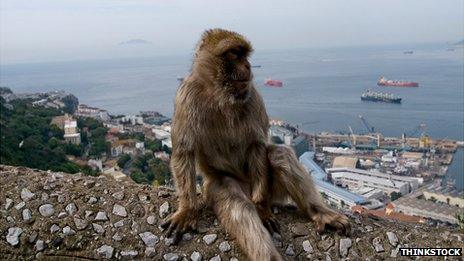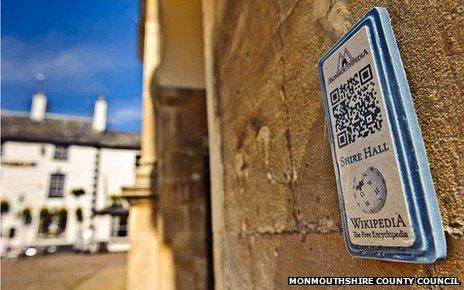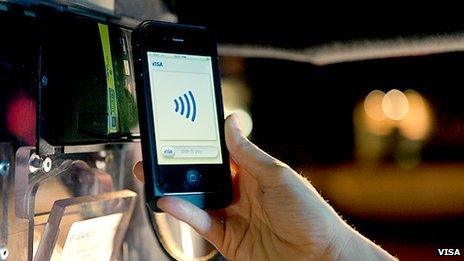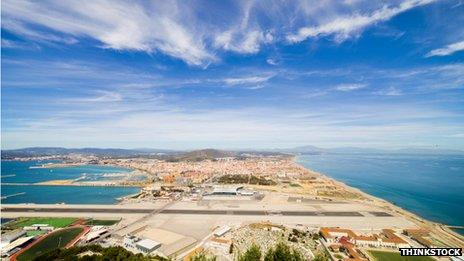Gibraltar targets tourists with Wikipedia QR codes
- Published

Many tourist attractions - though not Gibraltar's famous Barbary macaques - will carry QR codes
Driving along a sunlit road along Gibraltar's western slopes, a tourist stops by one of the city's top attractions - St Michael's Cave - and consults his travel guide.
Soon he won't need a book to learn more about this tiny British overseas territory in the Mediterranean, just south of Spain.
Following the lead of the UK town of Monmouth, Gibraltar is aiming to spill the content of the online encyclopaedia Wikipedia into the real world.
To do this, it is equipping Gibraltar's tourist attractions with QR codes - "quick response" barcodes that can be scanned with a mobile phone.
These black-and-white pixelated images have been around for more than two decades but have started to gain mainstream acceptance only in the past few years, appearing on everything from walls and billboards to newspapers and detergent packs.
As well as other technologies such as near-field communication tags (NFC) and augmented reality (AR) apps, they give mobile phone users information about a particular object.
QR codes store text, phone numbers, email addresses and calendar events, and once scanned, create links to websites or generate some interactive content on your smartphone's screen.

Monmouth in Wales became the world's first "Wikipedia town"
Tourism is a big part of Gibraltar's economy, with more than 11 million visitors spending £280m last year, and the authorities are keen to seize any opportunity to increase revenue.
The QR codes take users directly to a Wikipedia page of the relevant tourist attraction, says Clive Finlayson of the Gibraltar Museum.
"Gibraltar is a multi-layered cake of historical events, starting with the Neanderthals of 50,000 years ago through to modern humans," he says.
"Our own caving unit has now catalogued over 200 caves in Rock, with many being rich in archaeology but inaccessible to most people.
"Here we have another way of getting all this information across to the world."
Language barriers
"Gibraltarpedia" organisers want their QR codes to communicate with the user's phone to determine its set-up language, so a Brazilian tourist can be taken to a page in Portuguese, a Turk to one in Turkish and so on, says Roger Bamkin, a consultant to the Gibraltar government and a volunteer from Wikimedia UK, the charity that supports the online encyclopaedia.
"By scanning QR codes around them, tourists will be to able to find out about the place they are visiting in their own language, with the description written by a volunteer speaking that language," he says.
Volunteers have been producing up to 20 articles a day in various languages, and Mr Bamkin has been in Gibraltar this week seeking more people to contribute photos, maps and information on the territory's history.
But once all the landmarks are equipped with codes and all the articles are written, other factors need to be dealt with for the project to take off.
Roaming charges may deter visitors from connecting to the web - and the government of Gibraltar says it is considering the possibility of free wi-fi.
Also, tourists should be familiar with QR codes and be willing to use them. Although people may be used to seeing them, not many in the Western world actually scan them.

NFC technology already allows phones to be used as a "mobile wallet" for payments
On the other hand, in Japan and South Korea many use them on a daily basis.
Tesco Korea lets consumers shop in a virtual supermarket while standing on a subway platform. They scan images of groceries with a QR code reader and buy them with a click.
But Gibraltarpedia organisers say that they realise QR codes may be replaced by other technology - just as DVDs replaced CDs, says Mr Bamkin.
However, he believes that the project will be a success - and be it QR, NFC or any other future tech, Wikipedia is aiming to bridge online and offline worlds.
"Projects like Gibraltarpedia are a test of our mission," says Mr Bamkin, adding that the next target is expansion into northern Africa.
"Africans have a great need of free information - there are many more Wikipedia articles in the UK or France than there are in Morocco, Algeria, or Mali."

Wikimedia wants to extend the project beyond Gibraltar
- Published6 September 2012
- Published13 August 2012
- Published26 June 2012
- Published7 October 2011